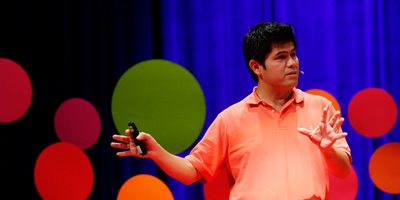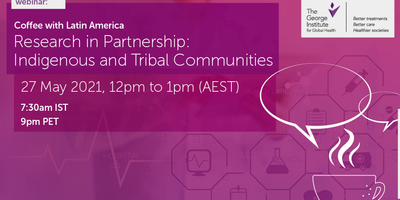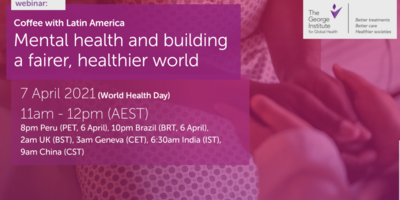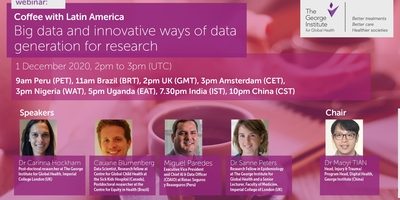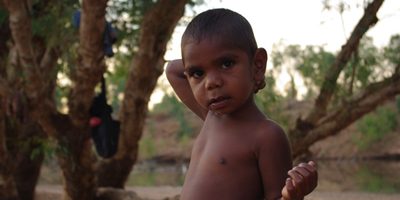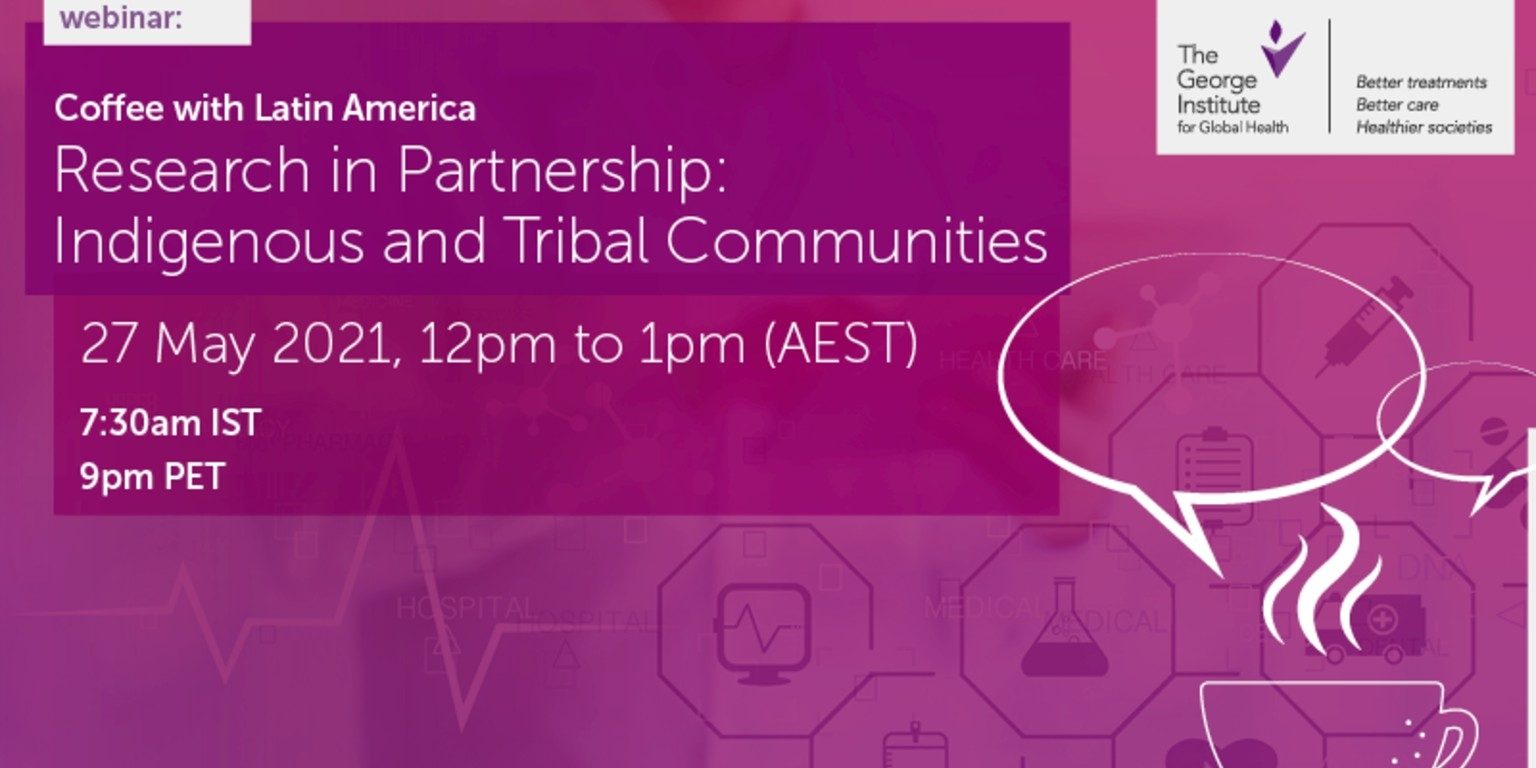
Blog: Key take outs and reflections from ‘Research in partnership: Indigenous and Tribal communities’
On May 27 The George Institute for Global Health hosted a ‘Coffee with Latin America' focusing on ‘Research in partnership: Indigenous and Tribal communities’.
Panellists from three countries shared their perspectives on research approaches and processes, community engagement, capacity building, and the use of Indigenous community-based research methodologies.
- Preety Rajbangshi, spoke about approaches undertaken to engage with the tribal communities affected by conflict and displacement in the North-east India. Preety is a Senior Research Fellow – Global Women’s Health, The George Institute for Global Health, India
- Carol Zavaleta, MD, PhD, spoke about how and why Indigenous communities are vulnerable to climate change effects in the Peruvian Amazon. Carol is a Wellcome International Training Fellow, Postdoctoral investigator, Unidad de Ciudadania Intercultural y Salud Indígena (UCISI), Facultad de Salud Pública, Universidad Peruana Cayetano Heredia, Peru
- Julieann Coombes, PhD, spoke about ‘Safe Pathways’, a quality improvement and partnership approach to discharge planning for Aboriginal and Torres Strait Islander children following burn injury. Julieann is a Research Fellow, Aboriginal & Torres Strait Islander Health Program, The George Institute for Global Health, Australia.
The session was Chaired by Keziah Bennett-Brook, Program Lead, Aboriginal and Torres Strait Islander Program and Professor J. Jaime Miranda, Visiting Professorial Fellow, The George Institute for Global Health; and Research Professor, Department of Medicine and Director, CRONICAS Centre of Excellence in Chronic Diseases, Universidad Cayetano Heredia, Peru. Sixty-four participants from Australia, Canada, India, New Zealand, Malaysia, Mexico, and Peru joined the virtual discussion.
Main points from the discussion
Overcoming deficit narratives: Many Indigenous and Tribal peoples have maintained a strong understanding of the relationship between people and land and nature while resisting and surviving the ongoing impacts of colonization, dispossession and other forms of structural violence. Indigenous and tribal peoples often share that history of colonization alongside other forms of marginalisation that have resulted in poor health outcomes. Often these experiences are not fully appreciated and deficit narratives can become dominant. This session emphasised the indigenous and holistic paradigm of health and healing and presented the opportunity to highlight some of the work being done to decolonize research spaces and focus on the empowerment and self-determination of communities. Unpacking the social and cultural determinants of health to include indigenous knowledges and methodologies in the research that we undertake is an intrinsic aspect.
Taking time to build trust: Often the history of prior interactions with Indigenous and Tribal communities has resulted in distrust of outsiders. The presenters discussed the importance of patience and approaches in building trust with the communities. This included one on one time spent with individuals and families to build a connection, ahead of any research being undertaken. Factoring continuing relationships beyond the project is also important not only for genuine interpersonal connections, but in case opportunities come up that may be of value for both researchers and communities to consider that are outside the scope of the initial project. Recognising this added time to build and continue relationships is difficult to quantify in funding applications (and even more difficult to secure funds to take forward!); this was identified as an area important to progress.
Navigating and understanding geography and location: In some contexts, there are physical barriers that need to be navigated. In others, there are political barriers. Sometimes these are combined. For example, access in the Amazon, both geographic and cultural, is very complicated, with rivers, mountains, and jungle to consider. As researchers we may say that people in these areas are remote communities, but we also can say that we're remote, we are remote to them. The conditions and the way of life of Indigenous communities are determined by those geographic conditions, especially given the centrality of land, and connection to it, for First Nations peoples. Both political and geographical barriers are often present in border regions. For example, Assam state in North East India has witnessed years of conflicts ranging from insurgency and various forms of ethnic violence. The, Bru tribal communities from Mizoram state displaced by ethnic conflict resulted in an exodus of more than 32,000 community members who continue to live in protracted displacement in Tripural state. They are not considered to be citizens of that state and are living in poverty and abysmal condition.
Who defines Impact: Who defines impact - is it researchers, funders, or the community? All are important and deserve consideration; all agreed that communities should derive benefits from and through their participation. It should be recognised, however, that the impact on policy is not determined by one study or one paper but the continuity of the work: the progress derived from layering one finding on others. Ultimately the aim is to produce high-quality research. Another view is that as long as the voices of First Nations Indigenous and tribal peoples are present in the research, policy progress will be made eventually that improves the rights of these communities. However, this demands not only that these voices are included, but that they are heard, and help influence outcomes that benefit such communities. In the global first nations indigenous community there's considerable strength and empowerment in demonstrating solidarity, coming together with a collective voice. Even though experiences are highly contextual and vary between different indigenous communities, there are still many shared lessons, insights and forms of support that can be mobilised.
Reflections from the presenters
Preety: “Today’s session was unique in its way as the focus of the discussion was about building partnerships with the Indigenous and tribal communities. The presentations were from three different continents and communities, yet the research principle was similar – a community-based participatory approach. While the session emphasized the need for adopting a collaborative method of research and respecting local indigenous and tribal culture and need, it also raised some pertinent questions. How results generated could impact the community or lead to a solution? How to measure impact and from whose lens (community, policymakers, or funder)? These are difficult questions to answer but I hope as a group we will keep engaging and reflecting.”
Carol: “It felt very good sharing my experience with Pretty and Julieann, my own work resonates with the word "patience" that Pretty mentions, and the "long hours on the phone talking with the mothers" that Julieann expressed. I am wondering if, do we need to transmit this to our funders, that we will need extra time and efforts, to engage with communities, to complete sample sizes, properly give back results to the community, and to foster a truly impact on policy makers? This interaction was also important for me because I met Keziah, a Torres Strait Islander researcher woman. Keziah is the first researcher I met that self-recognizes as Indigenous. I have learned that in other countries, including in Canada, there are more and more indigenous scientists, who are able to learn science while at the same time can practice their Indigenous traditions/knowledge/language. Can you imagine how beautiful is this? If you could go to an educational system where your home traditions are "normal" or at least are acknowledged as a common practice? can you imagine visiting a medical system where you can share that your parents or yourself have used Indigenous medicine, without feeling that you will be discriminated and seen as a ‘weird’? Having the opportunity to know Keziah, Julieann and Preety, made me feel ‘normal’.”
Julieann: “My reflection today was that we definitely need more researchers connecting with First Nation people in the community as we all have and also being able to have a platform for other First Nation researchers and community members to use their voice for self-determination in all areas of life.”
Reflections from the Chairs and audience
Keziah: “There were a lot of commonalities between the presentations today in what enables a research partnership with Indigenous or tribal communities to work well, which included the importance of building trusting relationships, engaging early and the importance of respecting culture and cultural knowledge. I really enjoyed the self-reflections from the presenters on the two-way learning that occurred between communities and researchers. So much of what is important about working in the Indigenous health space is about self-reflection on our own biases and practices. This reflection extended to the way we understand the impact and questioning what it means to conduct research that is able to enact meaningful change and of true benefit to First Nations communities.”
Kenneth Yakubu, Research Assistant & PhD Candidate, Health Systems Science: “The webinar made me realise that even with indigenous researchers leading research projects, it is still possible to conduct research from afar, “helicopter research” as some would say. Foreign partners are often blamed for this kind of practice, but there is a risk of indigenous researchers doing the same thing if they do not follow the necessary steps for community engagement. Hence, for us as a global health research institute, there is a need to keep on refining our “ethical compass”, as we strive to remain true to the co-production of knowledge, an end-point that is so easy to miss. Even though our projects may not allow for long-term engagement, communities need to see and feel that we care about them. This is hard, but it is the right thing to do. Current funding models might not prioritise this approach to research conduct. Nonetheless, we must strive to support community ownership of the knowledge production process.”
Anthony Zwi, Health, Rights and Development (HEARD @ UNSW): “Opportunities to hear about different communities, research processes, and contexts are always valuable. Preety’s ‘three most important points: context, context, context’ stuck with me. All case studies reveal how processes of colonisation and economic ‘development’ have often left First Nations people marginalised, stigmatised or in other ways disempowered. Researchers ought to acknowledge this and make sure that their interventions do not further disempower but are instead part of a process of claiming rights, articulating views, and enhancing health and wellbeing. First Nations people who are organised and articulate will greatly influence what research is done, how, and with what impact. Their agency and power will determine if and how those who believe in social justice, human rights and the right to health, can add value to the struggles of Indigenous, Tribal and First Nations Peoples.”
Jaime: “The session covered a range of health topics —sexual and reproductive health, food security and child burns— we heard the commonalities and strength of working with participatory methods. The uniqueness of the research approaches, always accommodating the research to hear the views —rather than, let's face it, the (usual) other way around— was important to unravel 'what matters'. Using participatory methods, ending up in co-creation through a re-alignment of research priorities and what ought to be researched, to key information to guide appropriate pathways to care, we learned a great deal across these experiences from India, Peru, and Australia. The discussion was also rich, and the audience engaged with some useful and pertinent research questions for the entire academic community: how long to build trust?, research for whom?, who owns the research?, and what does research impact means?, were among the few questions raised. Watch more in the recording and keep the conversation flowing!”
Contributions and edits:
Anthony Zwi, Health, Rights and Development (HEARD @ UNSW), Professor of Global Health and Development, University of New South Wales, Sydney
Kenneth Yakubu, MB.BS, FWACP (Fam Med), FMCFM, MBA-HUM, MPhil (Fam Med), Research Assistant & PhD Candidate, Health Systems Science, The George Institute, Australia
Carol Zavaleta, MD, PhD, Wellcome International Training Fellow, Unidad de Ciudadania Intercultural y Salud Indígena (UCISI), Facultad de Salud Pública y Administración , Universidad Peruana Cayetano Heredia
Jaime Miranda, Visiting Professorial Fellow, The George Institute for Global Health; and Research Professor, Department of Medicine and Director, CRONICAS Centre of Excellence in Chronic Diseases, Universidad Cayetano Heredia, Peru
Julieann Coombes, Research Fellow, Aboriginal & Torres Strait Islander Health Program, The George Institute for Global Health, Australia
Preety R Rajbangshi, Senior Research Fellow, Global Women’s Health Programme, The George Institute for Global Health, India
__________________________________________________________________________________________
The Coffee with Latin America sessions brings together a few speakers in a relaxed style. These sessions are conducted in the spirit of knowledge sharing, exploring opportunities and challenges, or innovative ways of approaching research.
This series aims to facilitate global collaboration and learning and provide an opportunity for outreach and connection with the global health community. Input, questions, and thoughts are encouraged during the session or following.





